#never love an anchor is so andrew coded
Explore tagged Tumblr posts
Text
"a ship could never love an anchor" but it's andrew minyard and the fact that all his relationships improved/were saved when the deals were called off
#never love an anchor is so andrew coded#aftg#all for the game#nora sakavic#andrew minyard#aaron minyard#neil josten#kevin day#twinyards#aftg meta#tfc#the foxhole court
77 notes
·
View notes
Text
Weekend links, April 28, 2024
My posts
I spent the first half of the week struggling through (well-medicated) mania and the second half currently with a sinus infection! I’m not enjoying it! Not either one!
Reblogs of interest
Pro-Gaza protests at universities in the U.S.: a solidarity Passover seder and an accidental Pulitzer photo
Canada Agrees 200 Islands Belong to the Indigenous Haida Nation
--
The Hot Vintage Lady Polls continue to go for the throat. I felt so bad about Dorothy Dandridge that I started posting and reblogging propaganda for her, but Ava Gardner, my beloved, went through anyway. Backing her felt like a wish on a monkey’s paw ("Not like this!!"). (See all poll results here.) I tremble to think what round 5 will look like. Like, there’s a point when your girl is gonna come up against a Hepburn, you know?
Notably gone this week: Judy Garland, Julie Andrews, Lupe Vélez, Irene Papas (who took out Vivien Leigh in the previous round), Gene Tierney, Barbara Stanwyck, Lena Horne, Jean Seberg, Anita Ekberg, Angela Lansbury, and Cyd Charisse. Like I keep saying, everybody loses. Everybody but one. Round 5 will start May 1st.
--
Hozier Watch 2024: His first U.S. #1, which he’s now playing at shows! The first U.S. #1 for an Irish artist in 34 years! What?? you cry. Did “Take Me to Church” not do that ten years ago? Well, I went and looked it up: No. That was the “Blank Space” era. Say no more.
Speaking of Taylor Swift—Paste Magazine went IN on the new album and got threats as a result. Meanwhile, Taylor’s fans are harassing the ex-boyfriend who did nothing wrong (as opposed to the racist one) because her PR is egging them on. I’ll admit: even though I’m not a fan, I found the Paste review to be overlong and not focused enough on the actual songs, proportionally. But that post about the PR saga is everything I miss about Fandom Wank.
(“My rival dresses to display her legs, and her shoes are of an alluring fashion”)
Meanwhile, the Watcher guys issued the best apology possible, although it was still excruciating to watch. (Background.) They will remain on YouTube while introducing the streaming service. As a Patreon member, I haven’t asked for my free subscription code yet, but I’m going to. Some fans forgave them pretty easily; others have walked away. I’m curious to see if this affects the mood of anything new they film, since a segment of the fandom got really, really ugly about it. Mostly it just felt sad all around.
Meanwhile, in Alabama: nobody wants to measure the feral hog.
Turns out Death Note had a good reason to concoct “American” names like “Bobson Dugnutt.” Also, I somehow had two posts tagged “death note” this week and I don’t even go here.
The worst brownies ever created and what Tumblr has to say about them
“You roll up to the Wizard Battle and your opponent takes out his spellbook but it’s just one of these”
I know that Loki is not Odin’s son in actual Norse mythology, but the bredlik is amazing.
TIL that Florence and Ravenna are still feuding over Dante’s remains
Maybe haunted dolls cost extra
Chorses
Video
Branch manager
Senior branch manager
“Free serotonin from Honey the Italian greyhound”
Sola learned to show love from her humans
I have seen many of jauncydev’s videos about dog personalities, but I have never seen him commit quite this hard before
I like tie-dye videos anyway, but this one is sick as hell
The sacred videos: you are not prepared for this police sketch, and neither is this news anchor
The sacred texts
Kick his ass, baby. I got yo flower.
Gold Star, You Tried: A compilation
A personal favorite: “mayhaps I TWIMST aroumd”
The origin of “By Talos this can’t be happening”
Personal tags of the week
Seasonally: cherry blossom. Also, art: an old standby, but it was really good, and also, I’m sick.
16 notes
·
View notes
Text
🕰️ Throw Back Thursday!
Hermione Phan
From a young age, Hermione showed promise. The younger sister of Jaqueline, Hermione was often considered the quieter of the two. But what she lacked in outward boldness, she made up for in sharp intellect and quiet determination. While Jaqueline pursued the lime-light and musical success, Hermione carved her own path in the digital world. She excelled in school, particularly in math and science, but her true passions lay in the glowing screen of her computer. Whether it was building custom mods for her favorite video games, decoding lines of alien-sounding code, or building tiny robots in the garage, Hermione was a tech prodigy.
But Hermione’s story took a remarkable turn the day her father, Andrew, returned from a top-secret interstellar mission.
He wasn’t alone.
With him came a nervous, green-skinned alien named Tyler Phan, who had been stranded after a lab accident on Sixam. Andrew, ever the compassionate adventurer, couldn’t bear to leave the young extraterrestrial behind and brought him to their family home in Willow Creek. Tyler was quiet, deeply observant, and curious about Sim culture—but above all, he was lonely. And Hermione noticed.
What began as polite conversations turned into long evenings teaching Tyler about the Sim world. She showed him everything: how to eat pancakes with a fork, how to ride a bike, how to use Simlish slang (which he picked up adorably wrong at first), and how to play video games, where, despite his calm demeanor, he turned out to be fiercely competitive. Hermione found herself laughing more than she had in years. And Tyler? He had never felt so accepted.
They were both outsiders in their own way. Hermione had always lived in her older sister’s shadow, and Tyler had literally fallen from the sky. But together, they made sense. He admired her brilliance. She adored his gentle heart.
After several years of dating and learning about one another’s worlds, the two married in a stunning ceremony at Notre Sim Cathedral. Hermione wore a simple, elegant dress laced with starlight embroidery, an homage to Tyler’s home planet. Tyler, who had embraced formal Sim attire, wore a tailored white tux with tiger-eye gem cufflinks, the color of Hermione’s eyes. The reception was held under an open sky, where Tyler’s relatives from Sixam attended invisibly, leaving traces of stardust in their wake.
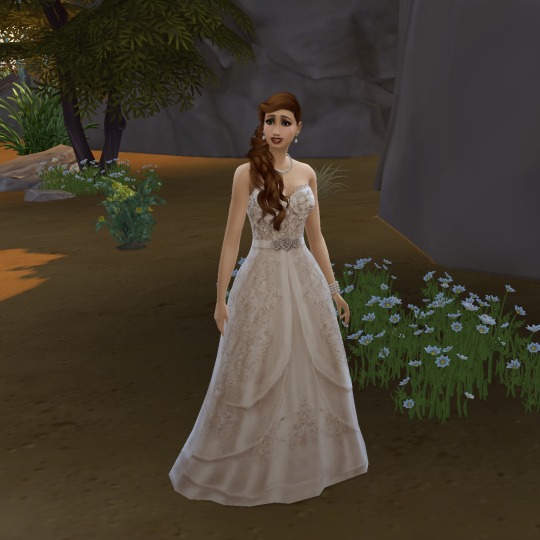
They moved into a modern desert home in Oasis Springs, a place Tyler loved for its closeness to the stars, and began building their lives together. Rather than rushing into pregnancy, they chose to adopt a child first. That child was Ulysses, a bright, inquisitive boy who shared Hermione’s thirst for knowledge. He was a straight-A student but battled with kleptomania, often bringing home trinkets and small gadgets he couldn’t explain taking. Hermione, drawing on her gentle patience, supported him through therapy and helped him channel his impulsivity into creative problem-solving. Tyler, too, provided an anchor, spending hours in the garden with Ulysses and teaching him how to repair and build small machines.
Years passed, and their home grew more vibrant with love and laughter. One spring morning, Hermione and Tyler received unexpected news. They were expecting not one child, but two. Fraternal twins, born under a full moon.
Jade and Rosa were half-human, half-Sixamian, and entirely their own. Jade inherited her father’s vegetarianism and calm demeanor. She preferred the quiet, often curling up on the back porch to read books or challenging Ulysses to thoughtful chess matches that lasted hours. She had her father’s luminous teal eyes and her mother’s quiet curiosity.
Rosa, in contrast, was fire and sound. She had a mischievous streak, constantly teasing her siblings, playing rebellious guitar riffs in her room, and sneaking off to late-night gigs even before she was old enough. Her rebelliousness didn’t come from defiance, Hermione always believed, but from a need to be seen. Rosa had inherited Tyler’s sharp intelligence, but filtered it through attitude and passion.
Though parenting three wildly different children was a challenge, Hermione handled it with grace. She continued her work as a freelance programmer, eventually creating an app that helped neurodiverse youth (like Ulysses) track habits and develop positive routines. The app gained modest acclaim, but Hermione never cared much for recognition. Her pride was in her family.
Tyler, meanwhile, had risen to prominence in the scientific community. He worked at the Oasis Springs Science Center, making breakthroughs in hybrid plant genomes and low-gravity simulations. Despite his growing reputation, he always made time to be home for dinner, where the family would gather around the outdoor table, surrounded by Tyler’s experimental glowing plants and Jade’s handmade wind chimes.
When all three children eventually left home, Ulysses to begin his medical school residency, Rosa to pursue music in the city, and Jade to enroll in medical school to follow in her big brother’s footsteps, Hermione and Tyler felt the house grow quiet. But not empty.
They held one last special dinner in their backyard under a string of solar-powered lights and the stars Tyler still looked up at with wonder. Their children returned, older now, but still full of the chaotic love that had made their house a home.
As night fell, they raised their glasses, a toast echoing through their Oasis Springs garden.
“To love across galaxies,” Hermione said, her voice steady, her eyes sparkling.
And Tyler, smiling at her like he had on the first day he learned to play video games, whispered back, “And to the girl who taught me how to live in this world.”
#ThrowBackThursday#SimsStory#SimsLegacy#TheSims4#TS4Storytelling#TS4Gameplay#ts4 simblr#simblr#ts4 legacy#ts4 screenshots#ts4
0 notes
Text
The Problem With (Forced) Happy Endings, or, Why I Hate The Phantom of the Opera
Yesterday, I was messing around on here and suggested that I hated the way The Phantom of the Opera ended. Then, I got the following ask:
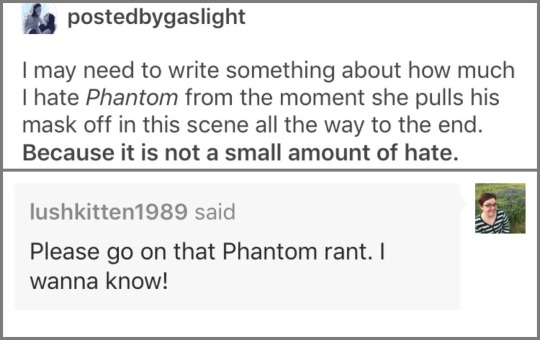
I thought I’d respond briefly, but then things got out of hand. So, @lushkitten1989, as promised, here’s way more than you bargained for.
There are many, many reasons to dislike Andrew Lloyd Webber’s monolithic Broadway musical, The Phantom of the Opera. So, I’ll dispose of some of the lower hanging fruit:
The story is dependent upon Christine being so naive that she doesn’t realize she’s getting music lessons from a guy behind a two-way mirror.
The phantom is a one-trick pony, defined almost entirely by his obsession with Christine. It’s never actually clear what he seeks to achieve by gaining de facto control of the day-to-day operations of the theater (other than merely being able to exercise that control— which may be the point).
Raoul is as interesting as a pet rock. He is unbuttered toast. He is Mom Jeans.
The music is intermittently great, but just as often annoying as hell (to me, for example, the “Angel of Music” motif is grating and uninspired).
Those are fundamental, but relatively minor complaints. Phantom has a lot of strengths. The chemistry between the Phantom and Christine is very pronounced, and, at times, shockingly blatant in its sexual themes. Some of the songs are timeless classics (“Phantom of the Opera,” “Music of the Night,” “All I Ask of You”), and some of the sequences, like the chandelier crashing down on the stage, and the ensemble pieces, like “Masquerade,” are very accomplished.
But where Phantom really shines is building a very genuine feeling tension between what propriety and social mores tell Christine Daae what she should desire, and what she actually desires. Phantom dabbles with Bride of the Monstrous themes, but never goes all in on them, and the result is a muddled, confused mess of a story— one that could have been very, very good, but wasn’t courageous or forward-thinking enough to capitalize on its opportunities.
See, the problem starts with Raoul.

Yes, wonderful, handsome, unthreatening, rich, devoted, patient, loving, convenient Raoul. The honorable Vicomte de Chagny, no less. He is our erstwhile Socially Acceptable Love Interest™️. From the moment he’s introduced, it’s clear Raoul is meant to be Christine’s white knight, swooping in to rescue her from obscurity. The plot contrives to have him coincidentally happen upon Christine, his childhood sweetheart, now a chorus girl at the opera house he favors with his parents’ fortune.
Now, I know what the Phantom fans might say: Raoul is here to allow for a juxtaposition of dynamics, placing him as an anchor point to which Christine can return, reminding her that she is more than the Phantom’s pet (or pupil, or lover, or what have you). But I’d counter that he’s really here to act as a stand-in for society’s expectations for how a well-behaved woman should conduct herself. Raoul is young, conventionally attractive, affluent, and, most importantly, chaste.
Christine’s connections with Raoul are explicitly drawn as being rooted in childish notions of affection. To wit, Raoul First greets Christine with a modified nursery rhyme she was read during their brief time together as children. He visits her in the soft-focus glow of her dressing room, showers her with praise, and proceeds to not listen to her when she insists she can’t go celebrate with him. More than that, he dismisses her objections with little more than a hand wave. The point is, he sees her as a child, and treats her as a child.
Look at what happens the moment he leaves her alone. She looks into the mirror, and runs toward the dark reflection behind her own image (heavy symbolism of Jungian animus here). From their very first physical encounter, the Phantom engages Christine as a sexual creature, and the difference in her reaction is, well:
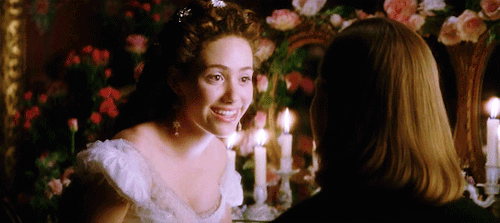
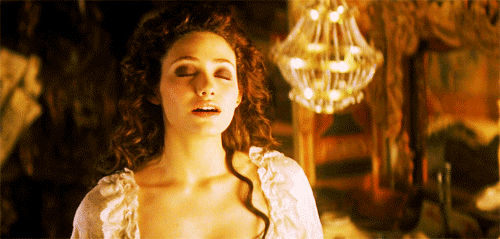
Once alone with the Phantom, Christine is no longer the child so idealized by Raoul. She’s a young woman seeking instruction of a different kind from a strange reflection of herself whose instructions have suddenly changed from anodyne singing lessons to exhortations to “feel the music of the night.”
The next time Christine is with Raoul is when they share their duet, the excellent, “All I Ask of You.” I say excellent because, like other tentpole numbers featured in Webber musicals, the song itself is brilliant, but, in the context of the play, it’s less inspiring. This is rather like “Memory” existing in a pop culture space entirely divorced from its origin in Cats, and I’m certain there are a fair number of people who simply identify the song as a soaring Barbra Streisand number, rather than the mournful plea of a neglected alley cat.
“All I Ask of You” is preceded by Christine trying to tell Raoul about her fear of the Phantom, and her growing unease at the magnetic pull he seems wield against her. Raoul’s immediate and repeated reaction? Something to the effect of: “There is no Phantom of the Opera. You’re imagining things. Don’t be silly.” The song then drives this home:
No more talk of darkness—Forget these wild-eyed fears—I’m here, nothing can harm you—My words will warm and calm you.
The call and response Christine and Raoul have here is staged as a sweet love song. And it is. But it’s also a proposal from a young man to a young woman, where the man suggests she abandon her desires to exist as a sexual being, and come be with him, where he’ll act as her protector against such base instincts.
And this tactic works. Christine is not so frightened of the Phantom himself— she pays lip service to being horrified at his murderous tendencies, but seems aware he would never harm her personally— as she is frightened of her seeming inability to resist her attraction to him.
Raoul positions himself as a shield Christine can hide behind so she never has to grow up. He prefers her as the girl who enchanted him when they were both children, and he’ll go to great lengths to keep her innocent and doe-eyed. Is it any wonder that Christine doesn’t want their engagement to be public? (Yes, I get that Christine doesn’t want to risk the Phantom’s wrath should he discover their impending marriage, but the whole thing looks more like Christine being very unsure as to what she really wants).
Raoul, who seems to be the only person in the play who continues to explicitly deny the existence of the Phantom into the second act, is, oddly, the first to run for a weapon when the Phantom shows himself. He’s the one who pushes Christine to acknowledge (falsely, I think) that her attraction to the Phantom is nothing more than a side-effect of Daddy issues. He insistently pushes forward with a plan to permanently rid both the Opera Populaire and Christine of the Phantom despite Christine’s warnings that Raoul doesn’t really understand what he’s fighting against. More than that, Raoul insists that Christine offer herself up as bait, and to do so publicly, an overt expression of control, of making her choose her loyalties in front of everyone.
Let’s pause a moment here before we get to the inflection point of the play. What I’m referencing is, of course, the aptly titled “Point of No Return,” wherein the true nature of Christine’s relationship with the Phantom is made public. I want to talk about the Phantom.
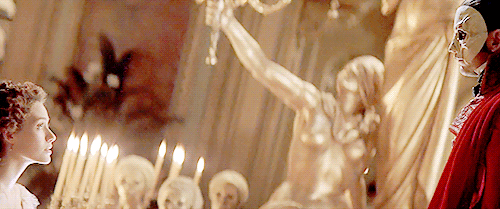
Throughout the entire play, the Phantom is presented as a sympathetic figure coded to represent misfit and outcast elements of society. He refers to himself as a “loathesome gargoyle” and confesses to Christine that he lashes out at the world and makes others fear him because he feels it’s his only choice for survival. But he also confesses to her that he secretly dreams of love and acceptance, and being able to live as he is, free from the condemnation of the wider world.
Yes, the Phantom expresses his displeasure with being defied in very unhealthy ways, but here we are again at the Death and the Maiden trope, wherein our heroine is the only person who is able to see beyond the darkness that both conceals and protects the man behind the mask. Here, Christine should be acting as the Phantom’s succor, a balm to his constant pain, and, in playing that part, she is meant to end his curse, or blunt its effects sufficiently enough for him to find peace. And, in return, the Phantom ought to provide Christine with growth beyond her childhood, and, in this version of events, usher in her sexual awakening and facilitate her passage into womanhood.
And it’s all set up to do that, for those themes to be realized, by the time the finale is cued up. Then, everything just goes to shit.
The Problem
If you’re unfamiliar with the way The Phantom of the Opera ends, you may want to stop reading.
After Christine stops Raoul from killing the Phantom in the graveyard, Raoul and the other peripheral characters contrive a plan to lure the Phantom into the open and kill or arrest him once and for all. The plan is simple enough. The Phantom has written an opera (aptly titled Don Juan Triumphant), and has ordered it be performed with Christine as the lead. Everyone assumes the Phantom will strike during the performance, most likely to claim Christine as his bride (or something like that).
Now, I posted a little joke earlier about what happens before the plan goes into effect. Raoul goes to Christine to comfort her and prepare her for her role in the trap, but Christine is very nervous about it. She tries to convey to Raoul why she’s apprehensive about the whole plan, but, again, Raoul doesn’t get it, and insists that Christine is getting worked up for nothing.
Of course, what ends up happening is “The Point of No Return,” the high point of the whole play, where the Phantom sheds all pretense and makes an overtly sexual appeal to Christine. And Christine, who’s supposed to be playing the role of Don Juan’s paramour, reciprocates the Phantom’s ardor, resulting in a very, very sexy sequence between the two of them. All while Raoul watches from the Phantom’s favored balcony (Box Five), and something like this happens:
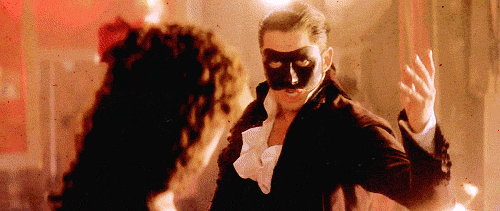
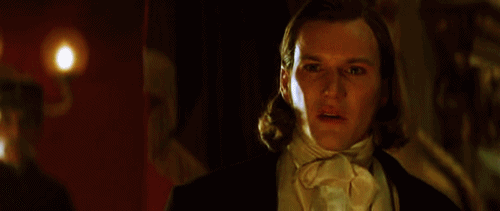
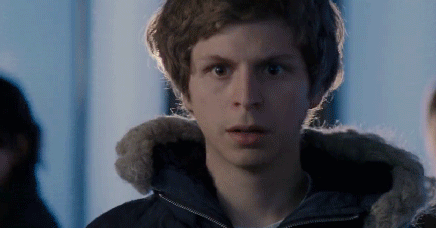
The Phantom speaks directly to Christine, saying:
I have brought you— so our passions may fuse and merge— in your mind, you’ve already succumbed to me— dropped all defenses, completely succumbed to me— now I am here with you— no second thoughts— you’ve decided—
To which Christine responds:
I have come here— hardly knowing the reason why— in my mind I’ve already imagined— our bodies entwining, defenseless and silent— now I am here with you— no second thoughts— I’ve decided—
This whole time, while the call and response between Christine and the Phantom reaches its fever pitch, Raoul watches, and understands the depth of his miscalculation. More than that, he’s horrified and repulsed by this display of lust from his innocent Christine. The mere suggestion that she might be complicit in the Phantom’s passions is something that, it can be observed above, threatens to break his world apart.
Thematically, this mirrors Raoul and Christine’s mutual declaration of chaste love in “All I Ask of You.” Which is important, because once the Phantom and Christine have crossed the metaphorical and literal bridge that separates them, and are embraced for all the world to see, the Phantom expands his entreaty, shifting from the blood-racing heat of “Point of No Return” to a soft, pleading reprise of “All I Ask of You.” He wants Christine to know he doesn’t just want her body, that he doesn’t just view her as a possession. That he loves her, just as much or more than Raoul.
And here is where Phantom could have become something great. Christine breaks free of the intoxicant of lust for the Phantom and turns to face him. He is emboldened, and reaches a more confident crescendo, saying
Anywhere you go, let me go, too— Christine, that’s all I ask of—
But the Phantom never finishes his sentence. Christine makes her choice, for sure. She does this. In front of the whole world. When the Phantom is most sincere and vulnerable.
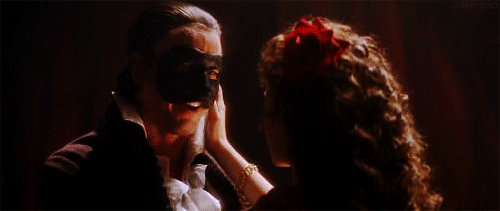
Now, I might have been prepared to forgive Christine this mistake if not for the scene earlier, when she and the Phantom were alone, and she tried to remove his mask. He lashed out at her then, and proceeded to explain his sensitivity to being exposed. He opened up to her and revealed his vulnerability. And, above, when the Phantom has finally allowed himself to hope that Christine’s affections are sincere and reciprocated, she betrays him.
It horrifies me.
For the rest of the play, all the sympathy the audience has been conditioned to direct toward the Phantom is inverted. Christine shows affection to him only to trap him. She even kisses him, leading him on again, for no reason but to quell his rage toward Raoul. Even after his beastly rage has subsided, Christine can only chide him for being monstrous in body and spirit.
This haunted face holds no horror for me now— it’s in your soul that the true distortion lies—
The arc presented for the audience— to sympathize with the Phantom, and to experience with Christine the fear and wonder that can attend the awakening of sexual consciousness, is utterly squandered.
But why?
Happily Ever After
The answer is as simple as it is disheartening: because Christine is supposed to end up with Raoul. Raoul is her destined love interest because the plot demands it, and no other reason. The two of them don’t grow as a couple during the course of the play. Their dynamic as they leave the Phantom’s lair is unchanged from the dynamic they presented when Raoul came to see her in her dressing room at the beginning of the play. Even after being forced to acknowledge Christine as a complicated and sexual being, Raoul elects to ignore that, and champions only freeing her from the Phantom’s corrupting influence.
To come to this point, Christine’s character actually regresses, choosing to retreat behind Raoul’s promise of perpetual innocence and naïveté. The narrative turns from one of growth and sexual agency to one that urges the rejection of what is unpleasant to acknowledge. Christine essentially chooses to marry the nice guy with the trust fund, stays at home to raise the kids and play the doting wife, and occasionally allows herself moments of indulgence to fantasize about the tall, dark, mysterious man she always wanted to fuck back in college.
To make matters even worse, the Phantom is abandoned to misery and solitude. His suffering is rewarded with more suffering. Christine leaves him without hope or promise, and the Phantom remains shrouded in the dark, pining for Christine for the rest of his life. Through trusting and hoping for acceptance and love, the Phantom is shown only the futility of seeking either. The way this plays out is deeply disconcerting, going so far as to set up a prologue and epilogue set fifty years later, after Christine’s death, with a grieving, crippled Raoul learning that the Phantom is still alive. This represents a casual erasure of Christine’s presence from the narrative, and, worse, diminishes her role to that of the object of the struggle between two men over a young woman’s emotional and sexual destiny.
This is an ugly, sad, wretched story. It’s not a story of yearning or forbidden love. It’s a story about rejection and denial of desire. It’s a story about choosing what society deems acceptable over the needs of the self. Moreover, it’s a story about being afraid and remaining afraid.
There is nothing affirming or beautiful about this story. And I fucking hate it.
#phantom of the opera#phantom x christine#raoul de chagny#christine daae#happily never after#what a waste
1K notes
·
View notes
Text

Thanks Nonie! Sorry for being late. I hope you like it! I posted it in AO3 too
The Fluffy Wolf & The Boy Who Smells Like Green
The Hale family was well known in Beacon Hills. In a small town like that, the only big family living all in one house was noticeable. They were six adults and a lot of kids. From months old to old enough to start college, the thirteen Hale kids were the famous part of the family.
Peter was the youngest ‘original’ Hale sibling. He had two kids, a girl called Malia and a boy called Matheo. Andrew was the oldest with six kids on his own, Lilly, Robin, Jules, Aaron, Hanna and the twins Rey and Cassy. Talia was the middle sister and she had the last five kids, David, Devon, Laura, Derek and Cora.
Talia was the first to be married, making her the one with the oldest kids. David was about to leave them, going to college. Devon had three more years before leaving as well. Laura was twelve, Derek was almost seven and Cora was the ‘baby’ with four.
With so many people in one family, the town was constantly seeing them everywhere. The popularity had nothing to do with the fancy cars or the big mansion outside town in the middle of the preserve. Or that mystery around where the money came from. No, not at all.
Thank Good nobody seemed to notice the howls in the night around the house. The werewolf part would be harder to explain.
It was for Derek’s birthday when Talia and her husband Daniel witnessed the cutest moment ever.
The Hales loved birthday parties, but the kids didn’t have a lot of friends outside the family. The big secret kept them away from school until they were old enough to control themselves. For the kids they made a bit deal about presents, games and fun, a way to distract them from the lack of new kids. For the teenagers, they were to high school and had his own friends, finding boring and not cool a party with a bunch of ‘babies’, and opting instead for a private movie and popcorn in their private cinema (cause they had one at the mansion) with that weird music they liked.
But despite the type of party, they always invited people who knew about the supernatural. They were mostly people with an important position in the community and that was another motive why the rest of the town looked at them like they were royalty. Not everyone could say they had part of the sheriff station in their kids’ birthday.
Deputy Stilinski was among those who knew. He was send looking for one feral animal, that an old lady saw running around from her windows. He was the one who found a young Aaron, with bright eyes, claws and growling. It was only luck that his partner didn’t see him until he changed back.
He had the Supernatural 101 course and from there, he and his wife were invited to every birthday party, every year. They went happily, enjoying the sound of children. John and Claudia didn’t have kids for the first couple of years, dozens of birthdays passed. But when Claudia had a boy, Claudia opted for being at home every time a Hale kid reached a new year.
“Mieczysław is old enough to have fun with the kids, John. You should bring him and Claudia this weekend.”
“He likes to be called Stiles, Talia and you know it. I’ll… I’ll talk to Claude.”
All that was how it happened.
XxXxXxX
Derek was a bit moody, he never liked the parties. Too much noise for his ears, too much people he didn’t like. The party was for him and his seven years. Of course, he loved the presents, but the price to spend hours with adults talking to him like he was a baby, like they always did with his cousins and siblings, was too much.
This time, he smelled something different. Sweet and green like candy with grass. He was approaching the living room when he saw him. A kid with big amber eyes and a ridiculous buzzcut.
“Derek, honey, came here” His mother called. “You know John and Claudia. This is Stiles, their son. He is four, be careful” That was a code to ‘he is a squishy human, don’t break him’. Derek was home schooled, since he didn’t have a lot of control and sometimes he changed when he was upset or sad. His dad said he didn’t have an anchor, whatever that was.
Before he could react to the human, Stiles, put a box in front his eyes. “It’s a present for you! I picked it but I don’t know if you would like it cause I don’t know you. Can we be friends? I only have one friend but Scott has ats..as.. he can’t breathe fine and can’t play with me to be superheroes.”
Derek felt his eyes fight the change and ran inside. Talia started to apologize but Stiles ran after him laughing and being loud, with the box firmly in his hand.
XxXxXxX
The party went on, Derek hiding in the weirdest places, and Stiles always finding him, telling everyone where he was. It was funny to see how, slowly, Derek was making easy for Stiles to find him, like he enjoyed the game.
“Derek, are you okay? Is Stiles too much for you? ” Daniel asked him when he found Derek hiding in his room and not down stairs like before.
“Stiles smells weird, dad” Sure, Stiles smelled like ADHD medication, but it wasn’t that weird for him. Maybe for a kid it was a stronger smell. “I can smell the color green on him. How I can smell a color?”
And okay, that wasn’t the smell he was thinking.
“Are you sure that’s what you feel?”
“Yes, is weird but nice. And he smells like candy too. “
Daniel was about to jump in happiness, or call his wife, but he needed to know for sure. “What is the first thing that pops in your mind if you think in Stiles?”
“Home? Like you and mom and everyone else. Like pack. But he is not pack, right? ”
XxXxXxX
The teenagers were bored soon and had permission to go out or be in their rooms. The babies and kids got tired after a while, falling asleep in the couch or the floor. Andrew and his wife were taking care of the mess the kids made. Soon, the guests left, leaving only John and Claudia at the end of the day.
“You should stay for dinner, there is something we have to talk. “
“Thanks for your invitation, Talia. We love to stay and Stiles liked Derek.“ Claudia said smiling at how hard Derek was attempting to glare at Stiles, who had a plush wolf in his little hands and was trying to touch Derek’s face with it.
“Stiles, don’t bother Derek. “ John told him.
“Oh trust, me, Derek is having fun with your son. If he was annoyed, he would…you know.” Daniel said letting his eyes glow for a second. John nodded understanding.
They watched them a little more before dinner. Stiles chatting about why he picked the wolf for Derek as a present, Derek participating with a yes or no here and there. Stiles seemed to be fine being the one talking, sitting right next to Derek in his personal space.
“Mom says there are wolves here but they are good wolves and they protect us. This is for you, he can protect you too!” Stiles said.
And without warning, Stiles kissed him in the cheek and pushed the wolf against Derek’s chest. Daniel, Talia, John and Claudia stayed quiet, as Derek wolfed out, eyes bright yellow, pointy ears and a lot of hair for a seven year old. They were expecting a scared Stiles, it happened before with other humans. But no, Stiles just stared with big eyes and run to his mother.
“Mom! Mom! Look at Derek! He is so fluffy!!”
Derek turned back to his human self, causing delight in Stiles. “Do it again, please!” And he did it. Perfectly in control, he changed between human and wolf a few more times until Stiles hugged him laughing at his new “awesome friend”.
“So, remember that conversation we needed to have? What do you remember about mates and anchors?” John asked for a whiskey.
XxXxXxX
It was late when Claudia said they had to go, John had a morning shift at the station next day. The house was silent, kids sleeping since the hour before, adults drinking coffee or something stronger.
They found Derek cuddling Stiles and the plush toy, asleep in one of the couches. Talia gasped and make gestures to Daniel, who went looking for something to take a picture.
After more than one picture (“This one is for us, this one is for you Claudia, this is from a different angle, John, is not the same…”) the Stilinskis really had to go.
“Derek, Der, Stiles has to go” Talia said tugging gently at his son’s arm. In a sleepy voice, he mumbled “Mine, don’t go” Claudia and Daniel made a slow “aww” and John just sighed.
“Maybe is better if he stays here tonight. I can pick him up in the morning if is okay with you guys”
“Seems like this is the only beginning”
“Are you sure you can handle Stiles more often?”
“Are you sure you can handle a protective Derek?”
The mothers laughed and the fathers exchanged a look that was a mix of “Oh God” and “I love my wife”
XxXxXxX
In the morning, when Stiles kissed him goodbye on the cheek, Derek smiled at the smell of green, safety and home.
14 notes
·
View notes
Photo

Listen to a page's DOM as it changes
#428 — February 19, 2020
Read on the Web
Frontend Focus

Understanding CSS Grid Template Areas — grid-template-areas is one of my personal favorite parts of CSS Grid as it lets you specify layouts in the form of strings of text that visually represent the outcome you want. This is a thorough introduction to the idea.
Rachel Andrew
Why JavaScript is Eating HTML — The idea of JavaScript and HTML remaining separate and never the twain shall meet is now decidedly old-school and HTML-in-JS (a la JSX) is definitely A Thing™. Here’s a tour of all the parts involved.
Mike Turley
Designing High-Impact Dashboards for BI — Embedded analytics can transform your product, but terrible presentation can get in the way of great data. Design expert Laura Klein shares UI/UX guidelines and tips to improve your application’s dashboards, analytics, and reports.
LOGI ANALYTICS sponsor
A Complete Guide to Web Links and Buttons — A great resource from CSS Tricks with a lot to digest here. Starts with the basic implementation of both but quickly moves into accessibility, UX flourishes, and styling.
Chris Coyier
While You Weren't Looking, CSS Gradients Got Better — Unless you are some sort of CSS gradient expert, you are going to learn something here. Avoiding repetition by not having to repeat colors anymore is a huge win, IMHO.
Ana Tudor
'Scroll To Text Fragment' Now in Chrome 80+ — Last year we mentioned the Text Fragments spec which will let you link directly to specific content within Web pages that doesn’t have an associated anchor element.. and Chrome now supports it although the formatting of the fragment name isn’t particularly elegant.
Chrome Platform Status
First Public Working Draft for Resize Observer — An interesting new spec from the W3C (based on the same concept as MutationObserver or IntersectionObserver) that lets you observe for changes to an element’s size.
W3C
💻 Jobs
Senior Frontend-Focused Engineer in Munich — Do you love working with React, TypeScript, GraphQL, and working in a user-centred team? Then you're in for a treat. 🍪 Let's protect some businesses together. 🙌
Finanzchef24
Find a Dev Job Through Vettery — Vettery is completely free for job seekers. Make a profile, name your salary, and connect with hiring managers from top employers.
Vettery
📙 Tutorials & Opinion
Same HTML, Different CSS — This is a step-by-step tutorial based on a concept from the old CSS Zen Garden site: Creating different designs via CSS while never touching the markup.
Ahmad Shadeed
Building a Performant Front-End Architecture — A technical writeup of the key things to consider performance-wise when building a front-end.
DebugBear
ImageCon 2020 Innovating the Visual Web — Uploading, managing, optimizing and delivering media slowing you down? Learn about serverless media best practices.
Cloudinary sponsor
Four Creative Ways to JavaScript Timing in Browsers — Interesting alternatives for setTimeout, setInterval, and requestAnimationFrame.
Omar Alshaker
How to Make a WebGL-Powered US Counties Map with D3 and Three.js — Creating a simple SVG-based map is one thing, but if you want the best performance, leaning on WebGL and your GPU is a good option. This tutorial covers how to approach moving from SVG to WebGL by way of Three.js.
Mika Iriarte
How to Build a Tinder-like Carousel in Vanilla JavaScript
Simone Manzi
Building an Image Gallery using PixiJS and WebGL — This goes beyond your typical image gallery with an interesting 3D effect. Lots of bits and pieces here to learn.
Luis Torres
Aborting a Fetch API Request — The Fetch API didn’t have the ability to abort a request in its early days (unlike XMLHttpRequest) but AbortController and AbortSignal can help you get the job done on all modern browsers.
Ganapati V S
How to Apply CSS3 Transforms to Background Images — A neat trick for applying CSS3 transforms (rotating and skewing elements) to your backgrounds.
Craig Buckler
(Please) Use a:visited in Your CSS Stylesheet — Help your visitors know which links they already visited. I can’t really argue with this.
Evert Pot
Don't Touch My Clipboard — You can (but shouldn’t) change how people copy text from your site.
Alex Ellis
An Accessibility Review of Squarespace, Wix, and Weebly — If you’re reading this newsletter you’re probably building your own pages from scratch or with a framework, but have you ever wondered just how good pages produced by tools like Squarespace or Wix are?
Terrill Thompson
Four Reasons to Still Use Sass in Your Frontend Project
Sonny Recio
Web Font of the Week
JetBrains Mono
From the creators of many a popular IDE comes a free and open source font specifically aimed at developers. I admit I'm a sucker for a monospaced font on the Web, but your mileage may vary.

🔧 Code, Tools and Resources

A Neumorphism/'Soft UI' CSS Shadow Generator — A simple online tool for creating elements matching the new design trend/fad.
Adam Giebl
Utopia: Tools for Fluid Responsive Design — There are two nifty tools here, a type scale calculator, and a CSS generator - both designed for scaling type and space without breakpoints.
James Gilyead and Trys Mudford
plink-plonk.js: Listen to Web Pages As Their DOM Changes — This is really cool. Run this code at a console on a ‘busy’ Web page with lots of DOM changes and updates and you’ll be able to ‘hear’ them taking place.
Tom Hicks
Croppola: Quick Web-Based Image Cropping — These sorts of quick online tools sometimes seem a dime and dozen but this is so quick and simple, I had to recommend it.
Croppola
Axe 3.5: Accessibility for Development Teams — The popular accessibility testing toolkit is now at 3.5. Includes a better color contrast test, several new rules, bug fixes, and Danish localisation.
Wilco Fiers
🗓 Upcoming Events
ConveyUX, March 3-5 — Seattle, USA — This West Coast user experience conference features over 65 sessions across three days.
POSTPONED: W3C Workshop on Web & Machine Learning, March 24-25 — Berlin, Germany — Hosted by Microsoft, this free event aims to “bring together providers of Machine Learning tools and frameworks with Web platform practitioners”.
ImageCon, April 22-23 — San Francisco, USA — Learn the latest in innovative approaches to the visual web.
by via Frontend Focus https://ift.tt/2V6bkic
0 notes
Text
Wk 5: Andy Warhol
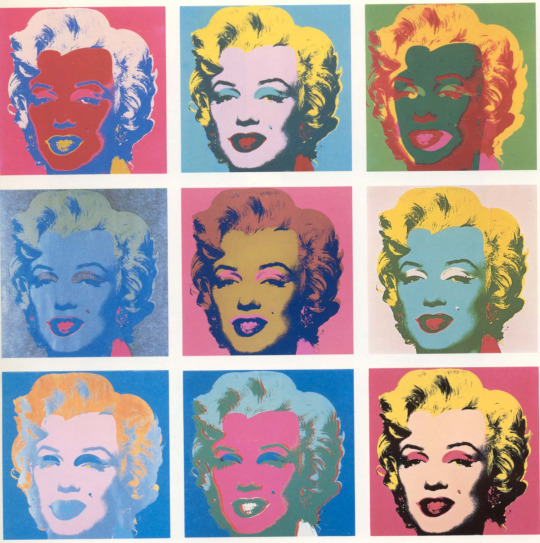
In the first session of today, we completed a mini case study on Andy Warhol. I touched on Andy Warhol during photography last year so I felt confident in completing this task.
Andy Warhol was born on August 6th 1928 as Andrew Warhola and died later on February 27th 1987. He was an artist, director and producer whom was a prominent figure in the visual art movement known as pop-art. Warhol was born in Pittsburgh, Pennsylvania and was the fourth child to his parents who were working class emigrants from Mikova, in Slovakia (Eastern Europe). His father emigrated to america in 1914 and his mother later joined him in 1921 after the death of his grandparents. The Warhol family were Ruthenian Catholic and attended St. John Chrysostom Byzantine Catholic Church. He had two older brothers, one of whom became a successful children’s book illustrator - James Warhola.
In the third year of his schooling, Warhol was diagnosed with Sydenham's chorea (St. Vitus' Dance) which later created further complications with Scarlet Fever. This made Andy bedridden for most of his childhood and he later became a hypochondriac, developing a fear of hospitals and doctors. He became an outcast at school but grew a strong bond with his mother. He claims this period of his life was important as it shaped his personality and also his future. Sadly however, when Warhol was 13, his Father died in an accident. As a teenager, he graduated Schenley High School in 1945 and even won the Scholastic Art and Writing Award. After graduating, his plans were to study Art Education at University of Pittsburgh and to become an art teacher but his plans were shortlived before he changed to study commercial art at Carnegie Mellon University. His first ever art publications were during this time while he was the art director of the student art magazine. He illustrated a full page interior design and also a magazine cover. Warhol earned a bachelor’s degree in Fine Arts in pictorial design in 1949 and later got a career in New York doing magazine illustration and advertising.
Andy adopted silk screen printmaking, rubber stamping then developed the blotted line skill which is blotting the paper in ink while its still wet, this was similar to his printmaking process. His aesthetic was a blend of photography and fine art and a majority of his artwork was around a list celebrities at the time and well known household items. His most famous artworks were of Marilyn Monroe, Elvis Presley, Prince Michael Jackson and a controversial piece he did was of Jackie Kennedy, a political individual at the time. Warhol’s specialisms consisted of drawing, painting, photography and film. He completed a series of screen tests where he placed a camera for several minutes and kept it snapping while the celebrity was told to stand and pose. Within those several minutes, you saw sides to the celebrity that people never knew existed.
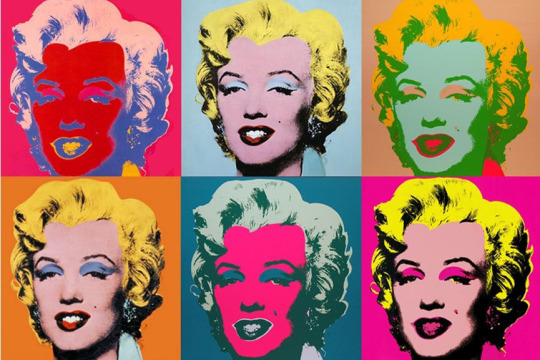
This first work I liked of Andy Warhol’s was the work called ‘Shot Marilyns’. It was made in 1964 and Warhol created the series of canvases using the technique silk-screening, each canvas using different colours. This was created in the same year Marilyn passed. He uses photo-stencils and photographic images for the screen prints. The screen is ‘prepared’ using a photographic process and then different coloured inks are printed using a rubber squeegee to press the paint onto the painting through the screen.
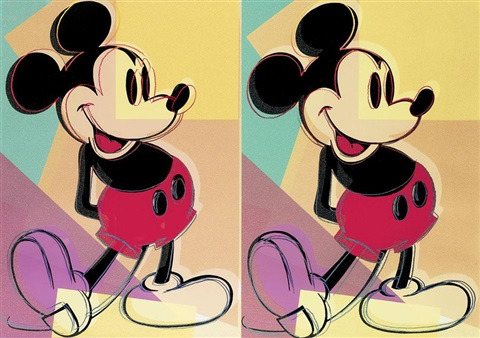
The second piece of Andy’s work I liked was the Mickey Mouse which was created in 1982. Like the Marilyn pieces, this was created using screenprinting onto paper. I liked this piece as it looks 3D in a way due to the way the colours sit just outside the lines drawn and possible down to the outline colours used. I feel like most of his work can be created on photoshop and illustrator, give or take using some filters to gain the same effect Andy mastered. As I think this piece takes more of a 3D effect, I think adding a 3D filter to the piece would make any work look similar to Andy Warhol’s Mickey Mouse.

This portrait of Prince was by Andy Warhol too and was created in 1984. Again, it was created using silkscreen print and acrylic polymer paint on a canvas, a technique moreorless created by the few artists popular involved in the art movement. This image was used on the front cover of a magazine last year in 2016 to commemorate Prince’s death.
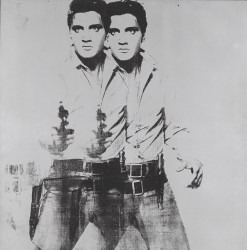
Double Elvis was created in 1963 using the same techniques as above; silkscreen ink on synthetic polymer paint on a canvas. Unlike the other pieces, this piece was created in black and white ink only. Warhol’s Double Elvis work looks the most simple and easy. You could take a photograph and in photoshop, duplicate a layer and then slightly manoeuvre it to the left or right. Changing the opacity of one or both may help. But creating a similar piece would be relatively easy as you’d only need to copy the image and move it.
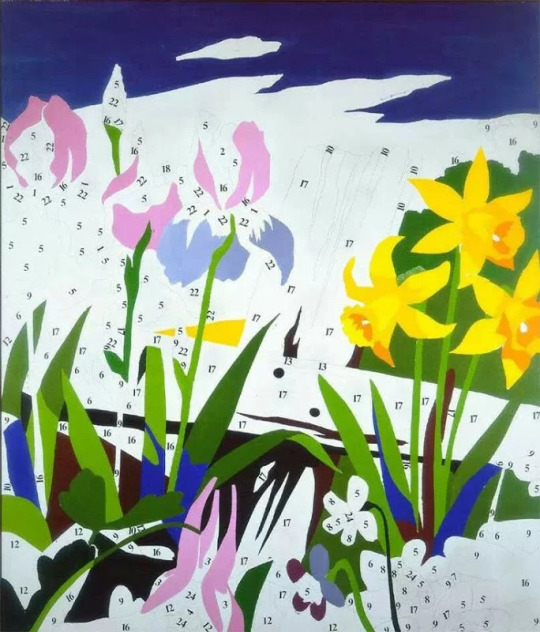
The last piece of Andy Warhol’s work I loved was the landscape version of ‘do it yourself’ created in 1962. As you can see by my selection, the pieces of work I enjoyed were all created within 20 years of each other. It was created using acrylic, pencil and Letraset (typeface) on linen. I liked it because it is different to his other works. It contains more block, bright colour and is a landscape/nature piece. Warhol was known for his portraits of famous people at the time so I find it quite refreshing to see a more subtle piece by him.
Pop-Art photoshop task
Our task was to non-destructibility edit this black and white photo of Marilyn Monroe.

I started off unlocking the background layer and duplicating it, using the shortcut ctrl + J.

I used the pen tool to select the entirety of her dress. This enable precise selection in Photoshop whereas in illustrator, it allows you to create actual shapes. Zooming into the photo aids and increases accuracy. Up in the tool bar, I enabled ‘Rubber Band’ under the cog icon.
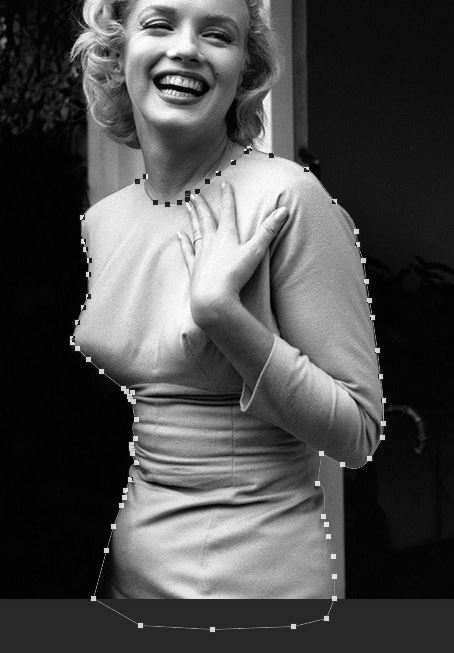

Clicking and holding allows you to drag and adjust the curve of an anchor point. This is most helpful when selecting shoulders and elbows etc.
I then needed to make a selection within a selection and to do this I moved onto the paths tab by the layers.

Right clicking and selecting ‘Make Selection’, this dialogue box appears. From this I ensured Feather Radius was set to 0.5 pixels.
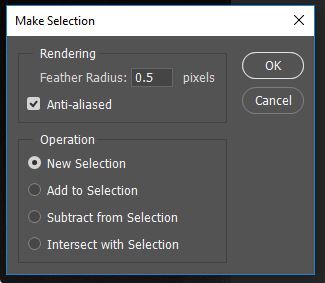
After clicking ‘ok’ I was then able to create another selection around her hand. This is so her dress is the only thing coloured and not her hand.


After making these selections, I made a new layer to add the colour non destructibility.

Using the paint brush tool, I was able to add colour to the image. I set my hardness down to 0% so the brush was really soft and delicate and I built up the colour gradually by increasing the opacity. My result was below.
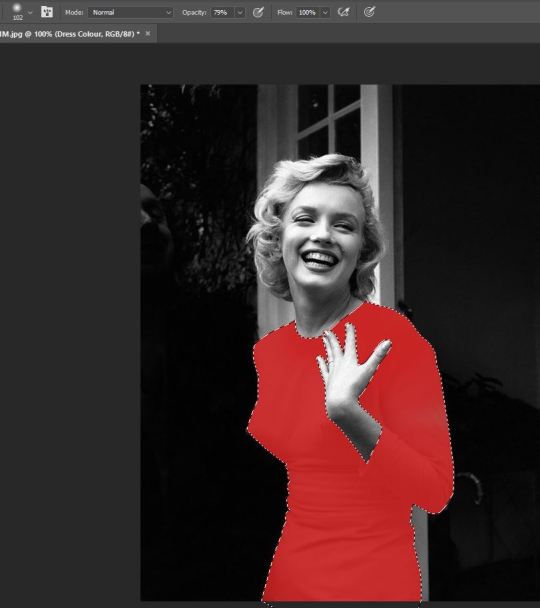
I needed to use blending modes so the colour blends in with the shape of her dress (the shadows and highlights etc) to make it look more realistic. I picked the blending mode ‘Muliply’.
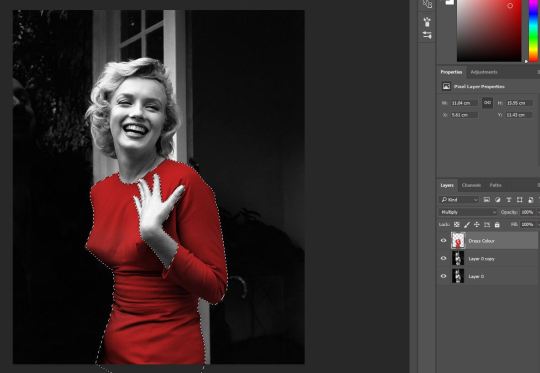
I then worked on her lip colour and I wanted it to match the colour of her dress. Using similar methods as above, I selected her lips and then made colour on a new layer.
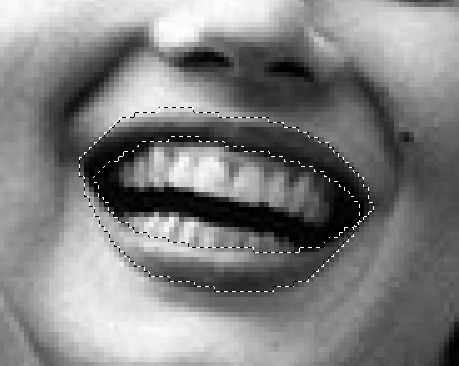
For the lips blending mode, I selected Overlay instead of Multiply. I found that this mode created more highlights and shine on her lips which I deemed more realistic.

For the skin, I looked up skin colour codes and found this website, I chose the first skin code #ffe0bd. For the blend mode however, I chose Soft Light.
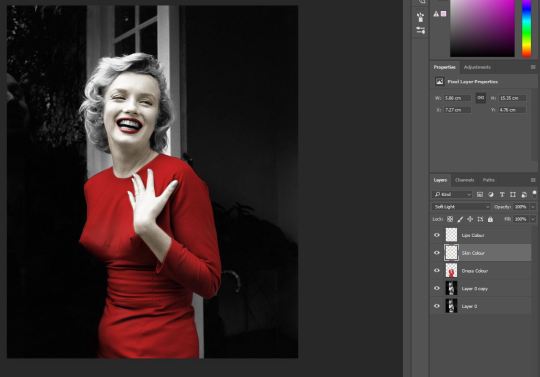
And finally for her hair, I chose a vibrant blonde colour and set the layer blend to Multiply.
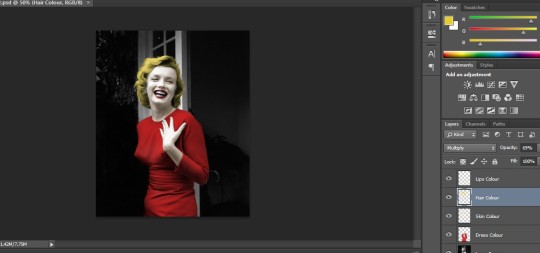
This is my final realistic recolour of Marilyn.
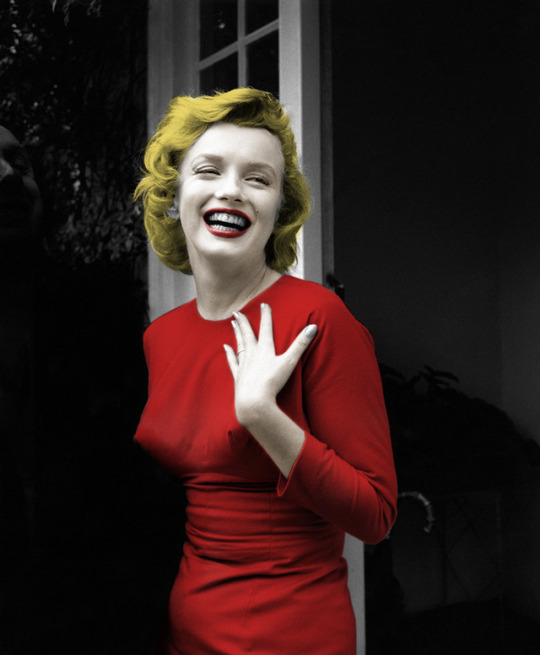
The second objective we had to complete was to create a new whole layer using the colour layers and then edit that layer so the colours became pop-arty. I copied my colour layers before merging them onto a new layer. Hiding this new layer still enables the realistic colours to be seen.
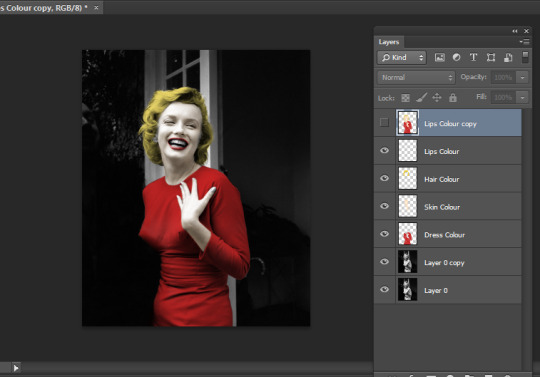
With that layer, I selected Hue/Saturation and dragged it onto the ‘Pop-Art’ layer. Dragging the Hue dialogue changes the colours drastically as you can see below. Hiding the pop-art layer will allow the realistic layers and colours to be seen again. This is non-destructibility editing the image.
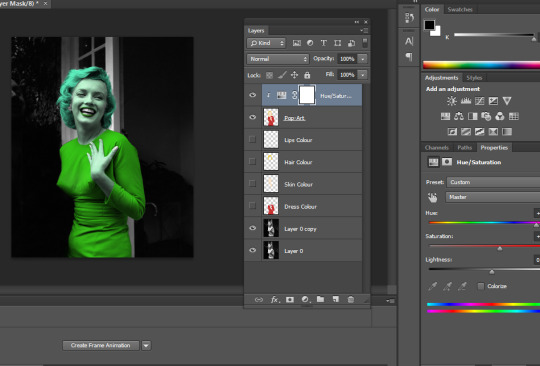
This is my final image with the pop-art effect on.

I think I have successfully recreated these Marilyn Monroe images. One is of realistic colour and the latter, following pop-art effect. I found the last part most difficult. Copying the layers onto a new layer and dragging the hue/saturation layer down. Using the pen tool and colouring each part was the easiest. I found these tasks both easy as I have experience doing them both out of college. I didn’t encounter any issues. Using the pen tool and colouring were the parts that I found went most well. However, that being said, choosing a hair colour that didn’t look just like ‘yellow’ was a challenge. If I were to do this task again, I’d take greater time and patience using the pen tool to select as I did unfortunately ruse to edit her hair and skin.
0 notes